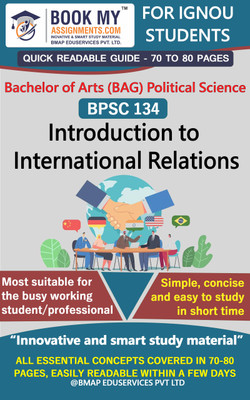IGNOU BPSC 134 Introduction to International Relations Study Guide (Quick Readable Notes) for Ignou Student.(Paperback, BMA Publication)
Quick Overview
Product Price Comparison
IGNOU BPSC 134 (Introduction to International Relations) involves condensing key concepts, theories, and methodologies related to international relations. Here's a structured approach to help you create your own notes:Introduction to International Relations:Define international relations as the study of interactions between states, non-state actors, and international institutions in the global arena.Discuss the importance of international relations in understanding global politics, security, economics, and diplomacy.Key Concepts in International Relations:Introduce fundamental concepts in international relations, including sovereignty, power, security, diplomacy, globalization, and international law.Discuss how these concepts shape the behavior of states and non-state actors in the international system.Theories of International Relations:Summarize major theoretical approaches in international relations, including realism, liberalism, constructivism, Marxism, and feminism.Discuss how these theories explain the causes of war, conflict resolution, cooperation, and international order.The International System:Define the international system and discuss different models of international system organization, including the balance of power, hegemony, multipolarity, and bipolarity.Explore contemporary debates about the nature and future of the international system.States and State Behavior:Define the state and discuss the role of states as key actors in international relations.Explore state behavior, including foreign policy decision-making, national security strategies, and alliance formation.Non-State Actors:Discuss the role of non-state actors, such as intergovernmental organizations (IGOs), non-governmental organizations (NGOs), multinational corporations (MNCs), and terrorist groups, in international relations.Explore how non-state actors influence global governance, human rights, and international security.


